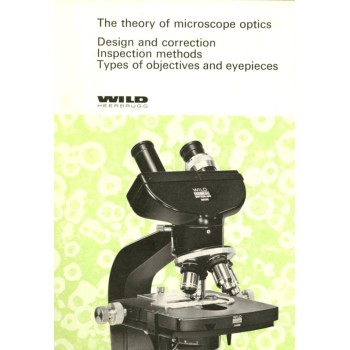Wild theory microscope optics inspection methods manual. Available to purchase for immediate download. Below is an extract from the manual converted to text for a quick impression on the content. Wild theory microscope optics inspection methods manualThe theory of microscope optics
Design and correction
Inspection methods
Types of objectives and eyepiecesThe theory of microscope optics
DeSign and correction
Inspection methods
Types of objectives and eyepieces
Today's microscopist has an embarrassing number of objectives to choose
from - achromats, semi-apochromats. and flat-field objectives of various
types are available.
Which type is best suited to his work?
When the choice is encountered. what are the criteria by which the quality
of the selected objective can be judged
ln the next few pages we want to try to answer these questions.
Lens aberration: and their correction
It is well known that simple lenses and lens systems have various imaging
imperfections, the so-called aberrations, Some appear in monochromatic
light: others are only apparent if polychromatic light (e.g. white light) is
used. Which aberrations are to be removed by the specialist who computes
the lenses depends on the intended application of the optical system
(microscope. telescope, photo- or cine optics). The most frequently-
encountered aberrations, which are particularly important in microscope
optics and which are to be appropriately corrected. are: Spherical aber-
ration, chromatic aberration, chromatic difference in magnification. field
curvature and astigmatism.
a) Spherical aberration
Spherical aberration is a defect characterised by the fact that monochro-
matic light (i. a. light of one colour) which passes through the lens close
to the optic axis is less refracted than are the correSponding peripheral rays:
Wild theory microscope optics inspection methods manual
- Hersteller Wild Heerbrugg
- Artikelnr. 3382
- Verfügbarkeit 1
-
4,70€
Schnellsuche Wild, theory, microscope, optics, inspection, methods, manual

